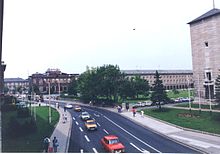Brothers and Sisters (1991)
Brothers and Sisters is a documentary by the filmmaker Pavel Schnabel , which portrays the fall of the Wall and the subsequent reunification in Weimar .
| Movie | |
|---|---|
| Original title | brothers and sisters |
| Country of production | Federal Republic of Germany |
| original language | German |
| Publishing year | 1991 |
| length | 98 minutes |
| Rod | |
| Director | Pavel Schnabel |
| production | Pavel Schnabel Filmproduktion, Frankfurt (Main) / Südwestfunk, Baden-Baden |
| music | “Sound Projects Weimar”, Michael von Hintzenstern, Hans Tutschku |
| camera | Pavel Schnabel |
content
Like a long-term study, the film accompanies selected Weimar citizens from 1988 to 1991. Among them are members of the "ACC Weimar", the writer Wolfgang Held , school director Michael Kallenbach, the pastry couple Mengs, the high school graduate Julia Müller and a number of others. In the sensitive interviews conducted by Pavel Schnabel, the protagonists tell of their fears and hopes, give an insight into their everyday life and into their worldview. The film deliberately dispenses with explanatory comments and radically focuses on the protagonists - even with all the contradictions. The result is a thoughtful, but above all authentic record of the turnaround in Weimar.
Background and origin
In the spring of 1988 Pavel Schnabel visited Weimar for the first time , which had just signed a city partnership with Trier . This east-west partnership gave the filmmaker the idea in the SWR series “People and Streets” to make a contribution about Karl-Marx-Straße in Trier and Karl-Marx-Platz in Weimar (today: Weimarplatz or Gauforum ) to rotate. In 1988 the GDR authorities gave him permission to film the documentary entitled “Karl Marx and his heirs - Weimar and Trier: a town twinning”. However, the production conditions were difficult: Schnabel could not freely choose the locations and protagonists; instead, the GDR authorities selected protagonists that conformed to the system and were supposed to paint a positive image of the GDR. In addition, the shooting was constantly monitored by three state "production assistants". In 1990 the 45-minute documentary film "The Turn on Karl-Marx-Platz in Weimar" was made, which shows the historical "Turns" in Weimar on the (architectural) metamorphosis of what was then Karl-Marx-Platz (previously: Museumsplatz, from 1937 : Adolf Hitler's place) should represent. These two films form the basis for “Brothers and Sisters”. Pavel Schnabel does not break off his protocol of the turnaround in Weimar immediately afterwards, but accompanies the protagonists of the first two films for another two years. At the end there is a documentary that uses a combination of old and new material to capture the changes of time and people in numerous pictures and conversations.
music
Apart from consciously used propagandistic music, the film mainly works with experimental music. This was composed especially for the film by “Klang Projekte Weimar”, Michael von Hintzenstern and Hans Tutschku.
Awards
The film was given the title “particularly valuable” by the German Film and Media Assessment (FBW) . The evaluation committee judged: "A film to think about, an important film with exciting material in the form of a cinematic diary."
Trivia
In one scene - during the conversation with writer Wolfgang Held on his terrace - Pavel Schnabel succeeds in panning the faces of the guardians placed by his side. "Die Welt" quotes the filmmaker: "I cut it in in the hope that there might be a few people who emotionally grasp that the looks of these men are a stark contradiction of the line-thrashing of phrases."
criticism
Klaus Wienert wrote in the Frankfurter Rundschau: “Among the innumerable attempts to film the process of German unity, Schnabel's film undoubtedly stands out - here the distanced view of the non-German is helpful; the bow could be struck beyond the day and the people affected express themselves openly and confidently about their experiences. "
In the SZ Christiane Grefe formulated: "The long-term observation not only provides a document of the reversible neck disease, but also of hope, fear and, above all, spiritual, but also very practical irritations of people."
Web links
- ACC Weimar
- Brothers and sisters in the Internet Movie Database (English)
Individual evidence
- ^ Opinion of the evaluation committee of the Filmbewertungsstelle Wiesbaden (FBW) from October 12, 1991.
- ↑ Lottmann, Gerda H .: West camera and strict Stasi view. In: Die Welt, July 18, 1991.
- ↑ Wienert, Klaus: "Kohl is now my chancellor ..." Changes in Weimar / film protocol by Pavel Schnabel, in: Frankfurter Rundschau, July 18, 1991.
- ^ Grefe, Christiane: Review, in: Süddeutsche Zeitung.
